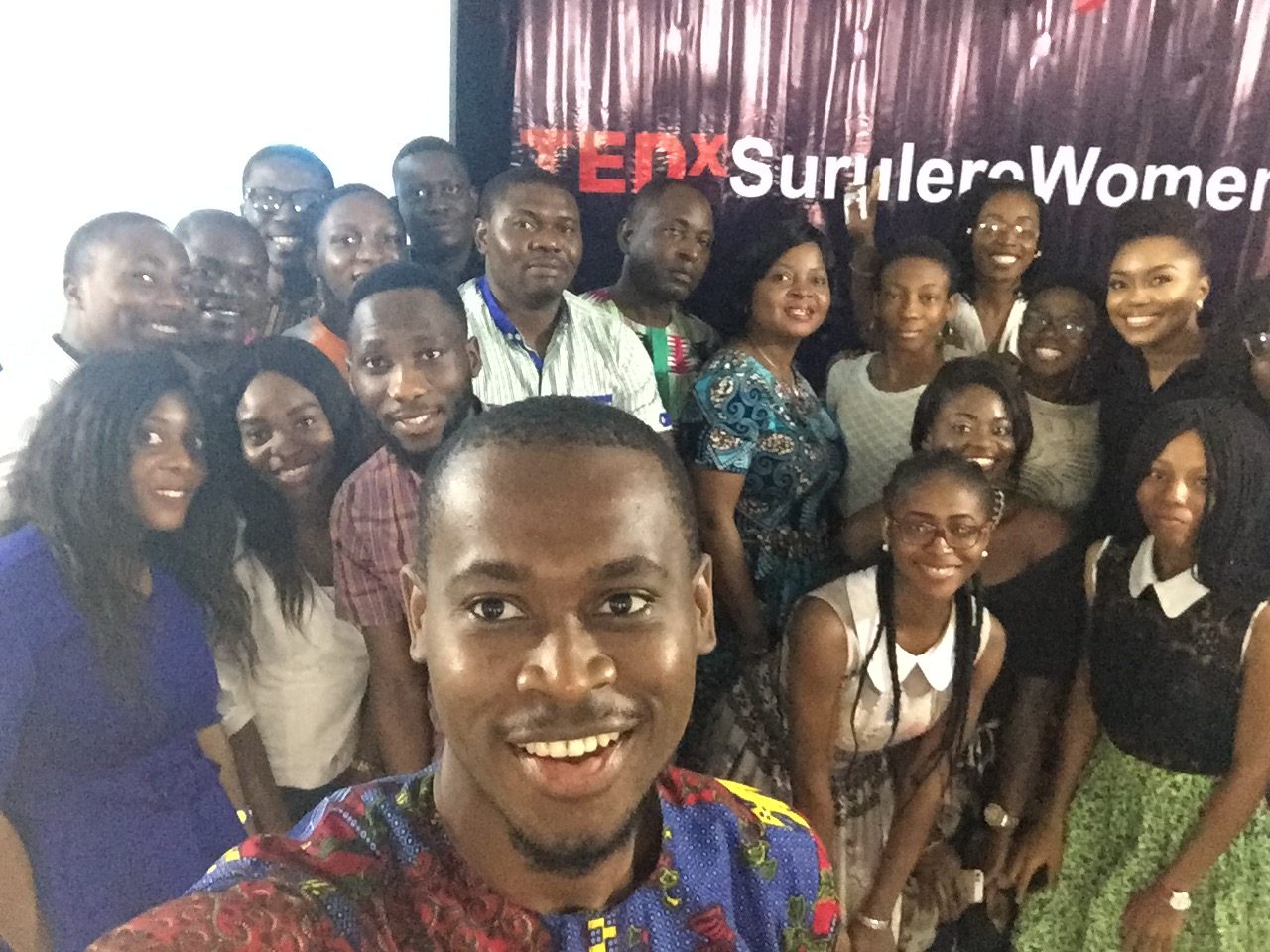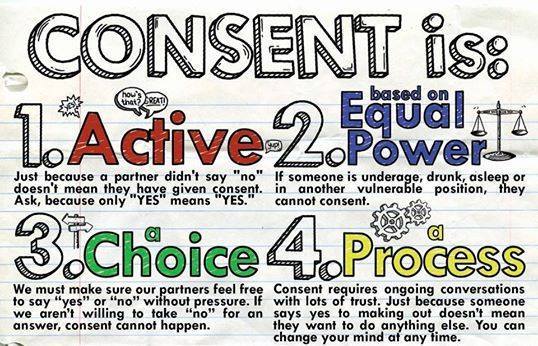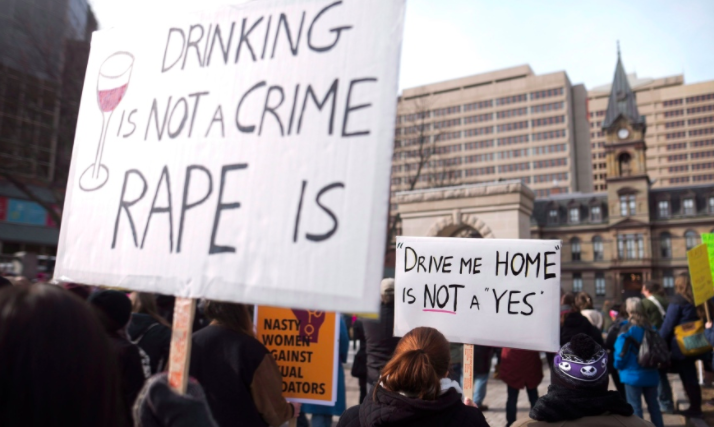Couple Saturdays ago, I spoke about “Consent: Un-Normalizing Sexual Harrasment” at #TEDxSurulere, the very first #TEDx event I‘d ever been to. Why did I choose to speak about something that (seemingly) affects women more? It’s for two simple reasons: men are the major perpetrators of the act, and women are the major victims. It is therefore not a problem specific to any gender; it is a human problem.
My talk was focused on what men should do to stop sexual harassment though. If you’ve been following recent happenings in Hollywood, you’ll see how shitty a lot of men have been. Sure that if Nigerian women begin to talk about their experiences in the hands of ‘influential’ men, your favorites may not go untainted. And before you wash your hands off this, we have all – by words, actions or inactions – allowed sexual harassment thrive. You can blame it on the society we grew up in, and the fact that some of these things were ‘normal’, but that is not good enough. To build a society where harassment is not tolerated, we (especially men) must now unlearn all the crap we grew up on, and relearn.

I hope you’re encouraged to take action after reading my TEDx talk; and do share with someone.
Preamble
Privileged to be here. Humbled as a matter of fact. To be speaking at an event for women.
Before I proceed, I need to mention that everything I’ll say here has been said before – by women, who are the most affected by these conversations. Most times, these women are ignored, shouted down, or labeled ‘bitter aunties’, because it seems like they are doing too much. But many have persevered and built movements championing conversations around consent, against rape, against domestic violence, and promoting gender equality. These women are heroes, and I acknowledge their sometimes unshakeable stance in the face of hostility and ridicule. Salute.
I also acknowledge the fact that some men have said some of these things before. But they have been ridiculed as well. They have been called names like “weak men”, “woman wrapper”, “Pick me…” and so on. I have been called those, but it doesn’t matter. The important thing is these conversations must be had, and derogatory labels can’t stop them.
Yaba
One time I was at Tejuosho market to buy kitchen stuff, and a girl who came to shop too got her ass squeezed by one of the sellers. I was expecting her to react – hit him, berate him or something, but she just turned, shook her head and continued on her way. Something in me snapped. I lunged at him and he asked me what he’d done in confusion. That infuriated me more – he didn’t even know he had done something. I asked him why he squeezed that girl’s ass like that, and as the realization dawned on him, I continued, “if somebody press your sister or wife or daughter nyash like that, you go like am?”
One of his colleagues was like “bros, wetin happen”, and I yelled at him like “wetin happen how? You no know say I fit arrest una for this nonsense”? They must have thought I was a serving soldier or something because they just calmed down. I used the opportunity to berate them further. “How una go just touch any woman wey pass una for market? Una no get mama for house?” Bla bla bla. Didn’t even care I was causing a scene. I was livid. My driving force was the fact that the girl’s reaction when her ass was squeezed was one of powerless resignation. I eventually left when more people were gathering but since that day, I have not stopped thinking about organizing a sensitization campaign for people in that market, and other markets in Lagos and Nigeria.
Professional harassment
Sometime last year, while waiting for NYSC, my very good friend – very pretty and smart lady – got a job in a media organization. She used to get sent to the government house for press briefings etc. In her words, “it was an utterly horrid experience”; one of the reasons she doesn’t want to do political journalism, ever.
After press briefings they’d interact with the politicians, and, these politicians – people we all know – were allowed to ‘act inappropriately’ towards them. Basically, the politicians could touch them, and so on, and the journalists were supposed to allow it as to not offend them. The politicians also wouldn’t take no as an answer to whatever they asked.
The amazing thing is, her office knew, as did other media outlets that sent their journalists. They specifically picked attractive ladies and sent them for those briefings, rarely men. The sexual harassment carried out by these politicians is basically endorsed by the employers, and the bemusing thing is the employers in this case is the media – body that is supposed to be the fifth arm of government.
This happens in other industries too, where marketers are compelled to use their bodies/allow sexual exploitation/harassment so they can meet their targets.
In summary
These are two different stories, real life stories of victims of sexual harassment. Stories most of us can relate to. Stories someone we know has experienced.
Stats – Culled from the pan-African medical journal
“According to the World Health Organization 1 in every 10 women on earth have been raped, 1 in every 5 have been sexually assaulted (may or may not have been raped), and 35% of women have experienced some sort of sexual harassment – verbal or physical. The reported figures are said to be inaccurate as most cases of sexual assault are under-reported by the victims because of the associated stigma. In Nigeria, only 2 of 40 cases of rape are reported, attributing this amongst other reasons, to the onerous legal requirements needed to prove the cases and the associated stigma.” https://www.ncbi.nlm.nih.gov/pmc/articles/PMC5075452/
Sexual assault is prevalent because we have normalized it. Now, the question is:
How can we un-normalalize sexual harassment?
This is not an exhaustive list. There are definitely other things we can do to end the scourge. But if we are serious about un-normalizing sexual harassment, we have to:
-
Understand it is not a woman problem
It is an “everybody” problem.
A lot of times when conversations about sexual harassment is being had, it is seen as a woman problem. But that is just wrong. We need to get to a point where we understand that this is everybody’s problem. It directly affects women mostly, yes, but who perpetrates the act? Yes, men. It is not a woman problem. It is a HUMAN problem.
-
Stop being reactive
We need to stop being reactive; start being proactive. How can we be proactive in ending sexual harassment, assault and rape? Tackling it from the root. Preventing it from the foundation. Prevention means understanding who perpetrates sexual violence and how we can reach them; unlearning how we are mis-educated about consent, sex, and hooking up; identifying the cultural roots mis-educating us; and being empowered to effectively create change in our communities toward ending rape.
-
Consent Education
I was on a show recently. It’s basically a candid chat show where we talk about sex, relationship and social issues from a gender point of view. Girls on one side, guys on one side – something like BKChat. Some dude had sent a story about how he invited a girl over, and she refused to have sex with him, so he kicked her out in the middle of the night. He’d invited her for an evening of fun – they’d gone to the club, he’d spent quite some money, they’d gone back to his house and he was expecting to, you know, get his ‘due’. In his words, “she came dressed for sex, but when I tried moving on her, she said she didn’t want to”. (‘dressed for sex’ – what the hell is that by the way? How does one dress for sex?) Anyways, at about 4 am, when he realized she was serious, he kicked her out.
Did he do well?
On the show (and from feedback on Social Media), some were arguing it was the guy’s right to kick her out because she refused him sex; some were blaming the girl for going to his house in the middle of the night. Some even said the girl should have just done it, because the guy had tried that night … after all she wasn’t a virgin. Some commended the guy for kicking her out, instead of raping her … you know, men are animals; we lose our control when we have an erection …
Nobody talked about the fundamental problem: the guy felt entitled to the girl’s body, and flipped when he couldn’t do what he wanted.
So I said; “you know how boys are crazy about Game Consoles right? PS4. FIFA 18. So if my friend invites me to come play PS4 overnight at his place – marathon, and I agree, but on getting there, I don’t feel like playing anymore, will he force me to play? Or kick me out? No he won’t. He may be disappointed, he may even be annoyed, but he won’t force the pad into my hands and scream “YOU MUST PLAY”. He will probably either sleep, or play with himself. Not as sweet, but, manageable.”
And that is the thing about consent.
Consent is simply an agreement between participants to engage in sexual activity. Even though it is not verbal all the time, verbally agreeing to different sexual activities can help you and your partner respect each other’s boundaries.

Positive consent is all about communication. Communicating when you change the type or degree of sexual activity with phrases like “Is this OK?” Explicitly agreeing to certain activities, either by saying “yes” or another affirmative statement like, “let’s do it”. Using physical cues to let the other person know you’re comfortable taking things to the next level.
In summary, positive consent must never leave room for doubt. If you are not sure, don’t.
So, educating men
The conversations have always been around what women should do. It should change to what men should do. We should teach our children consent. No means NO. And that is final.
-
Encourage the sexual liberation of women
One time I was making out with a ‘friend’ – I am sexually liberated, and single, so I apologize to people who may feel some type of way about this. So, we were making out and it was going well, then all of a sudden, she said “stop”. I’m sure a lot of guys here can relate. So I asked if she was sure, she said yes. And I said okay, and went to sleep. I don’t know how long I slept, but I woke up to her touching me and all. And I was like, “hellooo?? Thought you said you didn’t want to do this.” She muttered some incoherent nonsense but I think I heard her say “I was not expecting you to stop”. So I entered lecturer mode, sat her down and told her about consent, and why it was important to mean what you say, and say what you mean. I told her that having sex without putting up any resistance doesn’t make her cheap or easy, same way it doesn’t make me cheap or easy. I told her as an adult, it was okay to want, and practice safe sex, and while I understand that society has always tried to make women who ‘have/want’ sex feel bad, the only way society will stop demeaning sexually liberated women is if more women refuse to be demeaned by it.
Should I tell you what we did after the conversation? Noooope!
But I am certain she will never give anybody conflating signals anymore.
Disclaimer:
I won’t act like this whole thing is black and white. There is nuance to this, challenges and all. But we must rise above those challenges, for our sake, and the sake of the next generation.
Women have been seen as passive lovers, but I implore you all to move past that. Stop sending conflating signals. If you want to have sex, have sex. No should mean no, not ‘maybe’, ‘yes’, ‘try harder’ or ‘take it by force’. No should mean NO every time. And yes should mean yes.
-
Where feminism comes in
Chimamanda Adichie said “we should all be feminists” and I agree. While we are physically and biologically different, we are equal, and we should all have equal opportunities to “enjoy” life. Feminism, amongst other things pushes for an end to violence against women. I’m not saying one has to be a feminist to know rape or sexual assault is bad, but I’m saying if one is a feminist, one will definitely know not to sexually harass/assault anyone. One will also know how important it is to be part of the conversations, movements to end assault and violence against women.
I’ll let you come to the realization that feminism is key to achieving gender equality, which is key to making this world a better place, but while you’re at it, I implore you to, every chance you get:
Refuse to let sexual assault happen.
If you’re a CEO, ensure your team understands that your organization will not condone any form of harassment. If you’re employed, let your colleagues see you don’t joke with issues of harassment. If you’re a journalist, use your platform to spread awareness. If you’re on Social Media, use your accounts to promote conversations that un-normalize sexual harassment. If you’re a religious leader, teacher, shoemaker, celebrity … anything at all, use your voice, your words; let your actions show that you are completely against any form of harassment, anywhere, any time.






